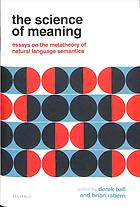
The Science of Meaning: Essays on the Metatheory of Natural Language Semantics PDF
Preview The Science of Meaning: Essays on the Metatheory of Natural Language Semantics
OUPCORRECTEDPROOF – FINAL,15/6/2018,SPi The Science of Meaning OUPCORRECTEDPROOF – FINAL,15/6/2018,SPi OUPCORRECTEDPROOF – FINAL,15/6/2018,SPi The Science of Meaning Essays on the Metatheory of Natural Language Semantics edited by Derek Ball and Brian Rabern 1 OUPCORRECTEDPROOF – FINAL,15/6/2018,SPi 3 GreatClarendonStreet,Oxford,OX26DP, UnitedKingdom OxfordUniversityPressisadepartmentoftheUniversityofOxford. ItfurtherstheUniversity’sobjectiveofexcellenceinresearch,scholarship, andeducationbypublishingworldwide.Oxfordisaregisteredtrademarkof OxfordUniversityPressintheUKandincertainothercountries ©theseveralcontributors2018 Themoralrightsoftheauthorshavebeenasserted FirstEditionpublishedin2018 Impression:1 Allrightsreserved.Nopartofthispublicationmaybereproduced,storedin aretrievalsystem,ortransmitted,inanyformorbyanymeans,withoutthe priorpermissioninwritingofOxfordUniversityPress,orasexpresslypermitted bylaw,bylicenceorundertermsagreedwiththeappropriatereprographics rightsorganization.Enquiriesconcerningreproductionoutsidethescopeofthe aboveshouldbesenttotheRightsDepartment,OxfordUniversityPress,atthe addressabove Youmustnotcirculatethisworkinanyotherform andyoumustimposethissameconditiononanyacquirer PublishedintheUnitedStatesofAmericabyOxfordUniversityPress 198MadisonAvenue,NewYork,NY10016,UnitedStatesofAmerica BritishLibraryCataloguinginPublicationData Dataavailable LibraryofCongressControlNumber:2017961365 ISBN 978–0–19–873954–8 Printedandboundby CPIGroup(UK)Ltd,Croydon,CR04YY LinkstothirdpartywebsitesareprovidedbyOxfordingoodfaithand forinformationonly.Oxforddisclaimsanyresponsibilityforthematerials containedinanythirdpartywebsitereferencedinthiswork. OUPCORRECTEDPROOF – FINAL,15/6/2018,SPi Contents Contributors vii IntroductiontotheScienceofMeaning 1 DerekBallandBrianRabern 1. Whatis—or,forthatMatter,isn’t—‘Experimental’Semantics? 46 PaulineJacobson 2. AxiomatizationintheMeaningSciences 73 WesleyH.HollidayandThomasF.Icard,III 3. DavidLewisonContext 98 RobertStalnaker 4. FromMeaningtoContent:IssuesinMeta-Semantics 113 FrançoisRecanati 5. RevivingtheParameterRevolutioninSemantics 138 BryanPickel,BrianRabern,andJoshDever 6. ChangingNotionsofLinguisticCompetenceintheHistory ofFormalSemantics 172 BarbaraH.Partee 7. LexicalMeaning,Concepts,andtheMetasemanticsofPredicates 197 MichaelGlanzberg 8. InterpretationandtheInterpreter:OntheRoleoftheInterpreterin DavidsonianFoundationalSemantics 226 KathrinGlüer 9. ExpressingExpectations 253 InésCrespo,HadilKarawani,andFrankVeltman 10. FregeanCompositionality 276 ThomasEdeZimmermann 11. SemanticTypologyandComposition 306 PaulM.Pietroski 12. SemanticsasModel-BasedScience 334 SethYalcin 13. SemanticPossibility 361 WolfgangSchwarz 14. SemanticsasMeasurement 381 DerekBall Index 411 OUPCORRECTEDPROOF – FINAL,15/6/2018,SPi OUPCORRECTEDPROOF – FINAL,15/6/2018,SPi Contributors Derek Ball,UniversityofStAndrews Inés Crespo,InstitutJean-NicodandNewYorkUniversity,Paris Josh Dever,UniversityofTexas,Austin Michael Glanzberg,NorthwesternUniversity Kathrin Glüer,StockholmUniversity Wesley H. Holliday,UniversityofCalifornia,Berkeley Thomas F. Icard, III,StanfordUniversity Pauline Jacobson,BrownUniversity Hadil Karawani,ZASBerlin Barbara H. Partee,UniversityofMassachusetts,Amherst Bryan Pickel,UniversityofEdinburgh Paul M. Pietroski,Rutgers,TheStateUniversityofNewJersey Brian Rabern,UniversityofEdinburgh François Recanati,InstitutJean-Nicod,Paris Wolfgang Schwarz,UniversityofEdinburgh Robert Stalnaker,MassachusettsInstituteofTechnology Frank Veltman,UniversityofAmsterdam Seth Yalcin,UniversityofCalifornia,Berkeley Thomas Ede Zimmermann,Goethe-UniversitätFrankfurt OUPCORRECTEDPROOF – FINAL,15/6/2018,SPi OUPCORRECTEDPROOF – FINAL,15/6/2018,SPi Introduction to the Science of Meaning DerekBallandBrianRabern By creating certain marks on paper, or by making certain sounds—breathing past a moving tongue—or by articulation of hands and bodies, language users can give expressiontotheirmentallives.Withlanguagewecommand,assert,query,emote, insult, and inspire. Language has meaning. This fact can be quite mystifying, yet a scienceoflinguisticmeaning—semantics—hasemergedattheintersectionofavariety ofdisciplines:philosophy,linguistics,computerscience,andpsychology. Semanticsisthestudyofmeaning.Butwhatexactlyis“meaning”?Whatisthetarget ofsemantictheory?Thereisaverywiderangeofviewsontheissue,rangingfrom theclaimthatsemanticsstudiessomethingpsychological(e.g.asemanticfacultyor brainprocessing),totheclaimthatsemanticsstudiessomethingaboutconventionsof thelinguisticcommunity,totheclaimthatsemanticsstudiesabstractmathematical structures—amongmanyotherpossibilities.Andevenifweknewthetarget,wewould facearangeoffurtherquestions:howshouldwetrytocharacterizethetarget?What wouldatheoryofthetargetlooklike? The aims of this Introduction are to acquaint the reader with some of the main views different theorists have taken on these difficult issues; to discuss the type of phenomena semanticists study; and to give some basic technical background in compositional model-theoretic semantics necessary to understand the chapters inthiscollection.Webeginwiththelastofthesetasks. I.1 Basics of Formal Semantics Whilefoundationalissuesremainhighlycontroversial,thereisadominantapproach tofirst-ordersemantictheorizing,whichtakestheformofacompositional,model- theoretic,andtruth-conditional(orinterpretive)semantics.Wefirstpresentsomeof theimportantpillarsofthisstyleofapproach,beforeturningtothemetatheoretical issues.
